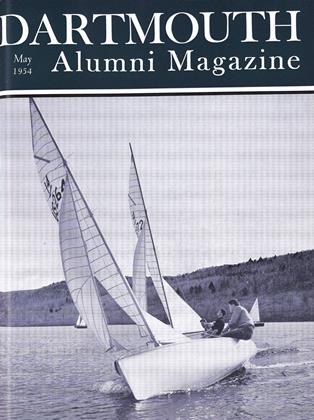A LTHOUGH I am not a stranger to the work and writings of the late Aldo Leopold, I am indebted to Dr. David Bradley '38 for the pleasure of reading A Sand County Almanac, published by the Oxford University Press, 1949.
Mr. Leopold was a conservationist, an ecologist, and a fine Wisconsin naturalist, who defined conservation as "a state of harmony between men and land." He did not want man to lose entirely the ancient skills he once had in pioneering travel and subsistence. He was all in favor of keeping public wilderness areas such as the Dinosaur National Monument now threatened by a dam, for he believed that "wilderness areas are first of all a series of sanctuaries for the primitive arts of wilderness travel, especially canoeing and packing," and should be maintained for the people.
He decries the modern example of the recreationist. "Take a look," he says, "first at any duck marsh. A cordon of parked cars surrounds it. Crouched on each point of its reedy margin is some pillar of society, automatic ready, trigger finger itching to break, if need be, every law of commonwealth or commonweal to kill a duck. That he is already overfed in no way dampens his avidity for gathering his meat from God." He concludes with the cheery thought that "Man always kills the things he loves, and so we the pioneers have killed our wilderness. Some say we had to. Be that as it may, I am glad I shall never be young without wild country to be young in. Of what avail are forty freedoms without a blank spot on the map?" This book can be highly recommended to all who love the outdoors, and who especially love the land that rightfully belongs to the American people. Like liberty such freedom to enjoy the land is not a natural right; it has to be constantly fought for. As there is nothing a congressman loves more than a vote, don't hesitate to write him about the issue of whether or not he will allow you to have any wilderness land to play and live in.
According to a new book, Conrad'sMeasure of Man, written by Paul L. Wiley, and published this year by the University of Wisconsin Press, Conrad now shares in the esteem accorded to Henry James and Andrt; Gide. Mr. Wiley examines the imagery in Conrad and has found consistent use of such Biblical images as the Expulsion from Eden, the Deluge, and the Last Judgment to suggest an atmosphere of moral chaos. As for me I would place Conrad above both Mr. Gide and Henry James as a writer of fiction.
Let me recommend also a new book on the late poet Dylan Thomas who, since his death at the age of 39 last November, has been hailed as one of the greatest of lyric poets, and "perhaps as the most richly and variously gifted writer, of our time." This book The Poetry of Dylan Thomas is written by Elder Olson, and contains a useful bibliography by William H. Huff. University of Chicago Press issued this one.
The author covers such topics as Thomas' techniques of depiction, his techniques of language, his sonnets, and in general the nature of both the poet and his poetry. It is probably too early to judge Dylan Thomas, who memorably read his poems at Dartmouth not long ago, but this is a worthy attempt and represents excellent scholarly criticism.
In The Pattern of the Communist Revolution Professor Hugh Seton-Watson is not afraid to describe slave labor camps as slave labor camps, and he is also not ashamed to point out that the imperfections of Western society cannot and should not be equated with the horrors of Communism.
Another important book, I think, on a subject of great importance today is K. M. Panikkar's book: Asia and Western Dominance (Allen and Unwin, London). The theme of the book is the advance and retreat of the West in the East. He writes from the point of view of an enlightened and distinguished Indian diplomat. Mr. Panikkar is profoundly critical of Europe, and especially of England. The idea that Great Britain stayed in India in order to train it for self-government and cleared out when her task was finished finds no favor in his eyes. Great Britain cleared out because she was forced to clear out. This book must be read and a few words in a review cannot do it justice.
For sheer reading delight I recommend the re-issue of W. H. Hudson's Idle Daysin Patagonia (Dent, London) by my friend David Dewar. If one work of Hudson's had to be chosen as most representative, this book would have strong claims.
 View Full Issue
View Full Issue
More From This Issue
-
 Feature
FeatureTHE CREATIVE ARTS
May 1954 By IRWIN ED MAN -
 Feature
FeatureSinging Ambassadors
May 1954 By ROBERT K. LEOPOLD '55 -
 Feature
FeatureThayer School's Fire Bug
May 1954 By FRANK PEMBERTON -
 Feature
FeatureON THE AIR 16 Hours a Day
May 1954 By DONALD R. MELTZER '54 -
 Class Notes
Class Notes1929
May 1954 By F. WILLIAM ANDRES, GEORGE E. REDDING -
 Class Notes
Class Notes1918
May 1954 By ERNEST H. EARLEY, RICHARD A. HOLTON
HERBERT F. WEST '22
-
 Article
ArticleHANOVER BROWSING
February 1935 By Herbert F. West '22 -
 Article
ArticleA Dartmouth Bookshelf
June 1946 By HERBERT F. WEST '22 -
 Article
ArticleHanover Browsing
May 1949 By HERBERT F. WEST '22 -
 Books
BooksCURRENT PROSE: A COLLEGE READER
July 1953 By HERBERT F. WEST '22 -
 Article
ArticleTHE GAME OF DEATH
November 1953 By Herbert F. West '22 -
 Article
ArticleHanover Browsing
February 1955 By HERBERT F. WEST '22








